EnergyDrive
The biggest bills beside our mortgage are energy bills
One of the largest bills we have today is our energy usage. In 2022 electricity, gas and oil prices have risen to their highest levels, partly because of the crisis in the Ukraine. The majority of large suppliers have made huge profits in the last 5 years but prices continue to rise.
Given the current cost of living crisis, It is more important than ever to understand how the things we use every day in our house affect our energy costs. See our section on facts to see more.
Switching for a better deal has never been more important. In the busy lives we lead it can be a real hassle to search around for a better price every year just like our car or house insurance. In fact, this is what the wholesalers hope and wish for; that once you change you won’t switch again. Well, that’s all changed now.
Choosing the right type of energy is also important today. We have large oil companies making billions of profit and energy companies holding consumers to ransom with no alternative in terms of choice. Government appears to be using a green agenda to push to switching to green sources.
EnergyDrive looks at the cost of heating and running your home, the cost of switching or not, the changes with smart meters and renewable energy, the issue with log burners and some best practice solutions to an all round approach to heating your home which is good for your pocket and the environment.
Click on a heading below and see a summary, and if you're interested you can GO and read more about it!
Here are some facts and stats about energy. GO!
See what types of energy you can have in your home. GO!
Log burners have become very popular – see more info. GO!
See what these are and how it can help. GO!
See how insulting your home can save money. GO!
See whether these are a good idea. GO!
See tips to help you save money. GO!
You can get incentives to make your home more energy efficient – is this a good idea? GO!
Is it a good idea to have a company switch your energy supplier automatically? GO!
If you’re a visitor to our site you can join and download information, assess your own health and create your own action plans, and even contribute to our site. GO!
See what you can do next. GO!
We have some additional information and stuff on this subject. GO!
Facts About Energy
Energy Costs Rise
If you see the news there’s a lot about the ‘cost of living crisis’ – this refers to the fall in ‘real’ disposable incomes (adjusted for inflation and after taxes and benefits). This is caused by a rise in inflation and the economic effects of the war in Ukraine and the Covid pandemic.
The Institute for Government explains: “It is being caused predominantly by high inflation outstripping wage and benefit increases and has been further exacerbated by recent tax increases.”
The rise in the cost of energy has had a huge impact on inflation across Europe, as explained in this article from Politico.
In the UK gas prices rose by 129.4% and electricity prices by 66.7% in the year to January 2023. As a result, almost 6 in 10 adults in the UK are using less fuel in their homes (ONS – download data here.). Around a quarter said cutting back on energy use had affected their mental health, and 20% their physical health.
Do you know how much it costs to run your central heating, or to use an electric blanket for an hour? To cook your meal in the oven, under the grill, fried, in slow cooker or microwave? You can see how much using your appliances costs at this site from Go.Compare.
switch suppliers
75% of households had not changed their electricity or gas supplier or tariff in the last 12 months.
was the average overpayment per year by people who don’t switch suppliers
In 2019, 23% households mentioned having changed suppliers
66.7& is how much electricity prices rose in the year to January 2023 (ONS)
23% of people have never switched their energy provider. [Money Supermarket]
is what energy suppliers say you can save by switching (2021)
25% of people admitted to having never checked to see if they could save money on their energy bills [Money Supermarket]

What type of energy should I consider in my home
The majority of homes today are not new and have traditional central heating, double glazing, roof and wall insulation. There are 29 million homes in the UK.
Most houses in the UK have the popular combi boilers which provide heating and hot water. These are usually supplied via gas or oil. The 23 million homes are on gas central heating account for around 77% of total UK heating output. Only 4% have oil and 7% have electric in a number of forms.
Only 5% of houses in the UK are not heated with a central heating system,[2021 statistic]..
Heat pump; central heating is installed in 103,000 dwellings..
Solar panels; 970,000 homes have installed solar panels.
Log burners; Currently, there are between 1.5 to 2 million homes in the UK with log burners and 175,000 new sales made each year but the government as part of the emission debate are trying to reduce log burner usage.
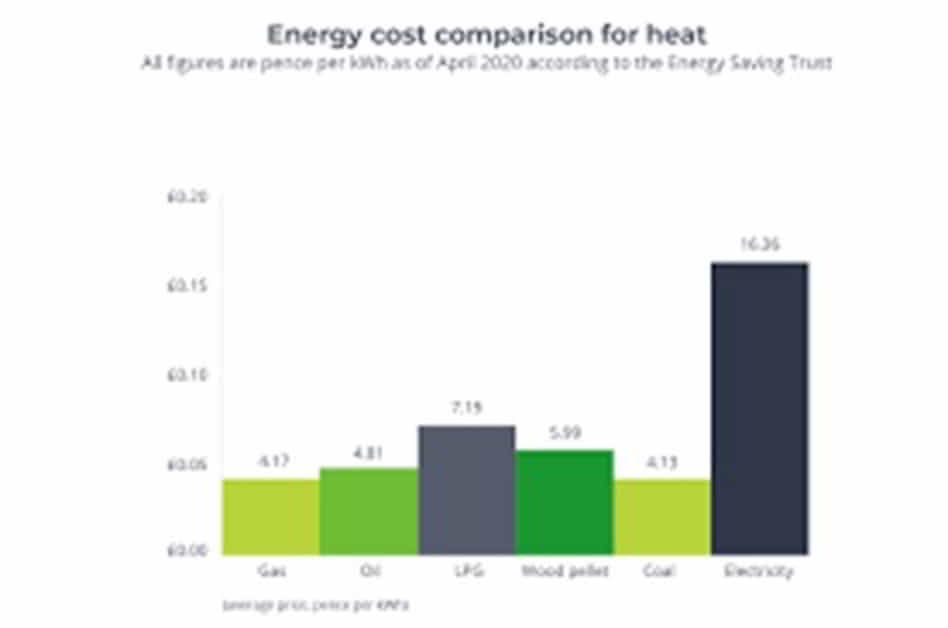
There are pros and cons to every heating system and it down to individual lifestyle. In the past Gas was the most convenient and popular, electric being the most expensive but today with energy prices increasing and Governments setting new environmental targets gas has now become the black sheep and electric the golden boy. But electric is a very expensive alternative.
Looking at the costs for energy, this simple graph on the left shows the comparisons; In 2022 the prices have all changed and costs are escalating for all products, best to do your homework first.
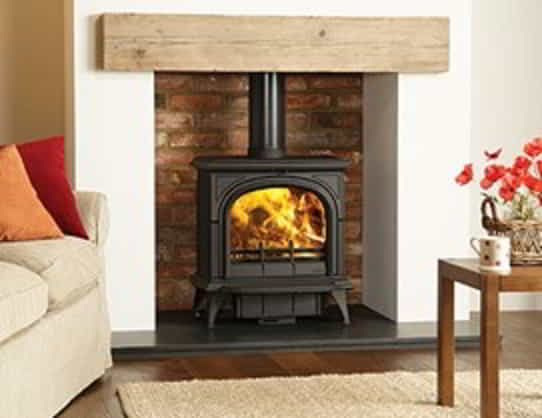
Log Burners are independent and increasing in popularity - I wonder why?
There are roughly 2 million homes with log burners and up until 2010 nobody talked about the health elements, emissions, and the controllability of the industry. The Government decided to start looking closely at this in 2012 and since then there have been surveys, lobby groups, green groups and new legislation and rules introduced from 2019. On top of this the media have enjoyed highlighting the health risk associated with Log burners. Sensational headlines and extracting selective information from health and environmental reports to promote their agenda.
Log burning has been around in our homes for thousands of years and up until 2021 was not overly controlled because it’s such a small group of people and users in comparison to cars, trucks, buses and planes.
Click on any of the tabs on the right to see more information
For hundreds of years local country communities have burned very environmentally friendly logs in their homes without regulation or tax and VAT, a grey market. Local trade between farmers and communities thrived for generations without problem. In 2012 the spy glass turned to this smaller group armed with environmental and health issues. Reading the surveys and papers associated with burning logs it was clear these groups wanted to make the findings fit the narrative and start to legislate log burning.
This headline is typical of the sensationalism; “The air pollution from wood burning in homes is responsible for more than £1bn a year in health-related damages in the UK according to a report.”
The researchers said their cost estimates were conservative because lack of data prevented them from including the impact of indoor air pollution from heating.
“It is clearer than ever that burning biomass and fossil fuels at home is not only an environmental problem, but also a major health problem,” said Milka Sokolović, the EPHA director general.
The Government did a survey on wood burners and their usage and here are some of the highlights that resulted in them taking steps to introduce new regulations on burning wood. The rules apply to burning wet wood which without doubt does add more carbon to the atmosphere. Later we shall look at the Government’s scheme on Kiln Dried wood.

Out of the population of circa 2 million log burner owners in the UK the sample size was 1,206 of which Northern Ireland have 188 18.4% of the total sample.
The significant column Is the percentage of off gas grid, in other words they use log burners because there is only electric alternative. Northern Ireland do not capture this data but the gas grid in NI is poor and its estimated 80% of users are off grid.

This chart shows a high percentage of people in the South East and slightly high in the north west have log burners. But within the report it states only 5 per cent of households in the South East (compared to 17 per cent in the South West) use wood fuel for all their heating, implying its for occasional use. Also, the south west is more rural and spread out than the densely populated south east.
When questioned about the usage of log burners, the majority of respondents (80 per cent) used wood fuel to provide some home heating 12% of respondents were high wood fuel users.
Only 1.3 per cent of respondents used wood fuel for either all or some of their cooking.
Log burners users started burning their logs in October and finished in March. Most log burners are not used in the spring and summer. In south east and London had the highest number of log burners but the lowest usage per week. Usage was higher when log burners are the main source of heating and no gas is available.

The Average winter usage per the survey was 3 hours per day but this was distorted by the high users being in minority and the high volumes being low users. Summer usage was 1.4 hours a day but again difficult to say houses with central heating support used log burners in the summer time.
This is a statement within the survey;
Uncertainties – There are significant uncertainties inherent in using a large-scale household survey [1200] to estimate domestic wood fuel use.
Further; In addition to general uncertainties around sampling and limited demographic data on respondents, there are risks inherent in the methodology used (appliance use).
• Respondents’ recollection of the start of the heating season over a year previously would
• have introduced some inaccuracies
• The number of hours of operation per week was a fairly crude scale
• The appliance ratings and efficiencies are expected UK averages estimated by expert
• opinion
• quantity estimation methodology was deemed to pose a greater risk to the accuracy of the results.
• Difficulty in estimating quantities of wood fuel delivered
• Estimates of quantities purchased are in anticipation of heating requirements rather than
• how much was actually used during the period being surveyed
• The moisture content of wood fuel is difficult to ascertain
• Length of heating season
• These uncertainties are especially hard to quantify as they depend on the judgement of individuals.
• Quantity of logs delivered is a critical parameter, as logs make up 76% of the total wood fuel.
• subjectivity to uncertainty both due to estimating the quantity and to understanding of the moisture contents of the logs. Units such as ‘trailer loads’ are particularly uncertain.
However, 93% of the total logs were quoted in tonnes, so the primary uncertainty is in moisture content and in the accuracy of assessment of quantity.
Although the survey resulted in a large volume of data being collected, several categories resulted
in such a small sample that disclosure was a risk resulting in a large proportion of cells being
supressed and also resulted in limited statistical value. This applied in particular to certain
geographic regions, particularly the North East, and with certain appliance types.
The Government has banned the sale of Wet Wood. This ban becomes law on February 21st 2021.
If you read the survey on log burners and wood usage there was clearly some evidence of grey wood activity in other words the Government had no control over volumes of wood sold or the quantities and it appeared very much a unruled market.
Therefore, in February 2021 under the green emissions banner a ban on providing and selling wet logs was introduced. New rules on supply, registration and regulations and fines imposed on those failing to meet the guidelines.
What does this mean for the average log burner consumer is prices have now increased 200% for a stair of logs. Suppliers have to declare and maintain records of batches of logs for burning and its ILLEGAL to sell logs with a moisture content above 20% in more usage that 2 cubic meters.
To make this even worse the Government have said log burners are polluting the UK and it’s not carbon friendly. Burning logs its totally carbon neutral. A tree falls down naturally, the farmer chops it up and sells it to a consumer all done locally reducing fuel costs.
Traditionally, logs are supplied from trees that are fallen. They stay in fields for years drying out. He farmer cuts them up and leaves them to dry. After a couple of years, they are stacked and sold to neighbours and towns. The whole process can take 5 years. Yes, the negative is nobody is checking the moisture content but the wood won’t burn well if its too wet and the farmers know this.

Logs sold [ ready for use] Must have a 3% moisture content or less which means the have to go through processing. Now a new industry has emerged on industrial estates. So now the farmer must take their fallen trees, cut them into small pieces and transport them into towns and industrial estates to large purpose-built kilns. These kilns are operated on Gas and Electric. The Wood is then off loaded and stacked in the kilns and over several days are dried artificially using other power that would have normally been done by the sun and the wind. They are then restacked and classified and put back onto a transporter to be sent to wood distribution centres for farmers to resell to their neighbours.
So finally, on this; how can the Government’s process be classed as carbon friendly and the latter old-fashioned method not.
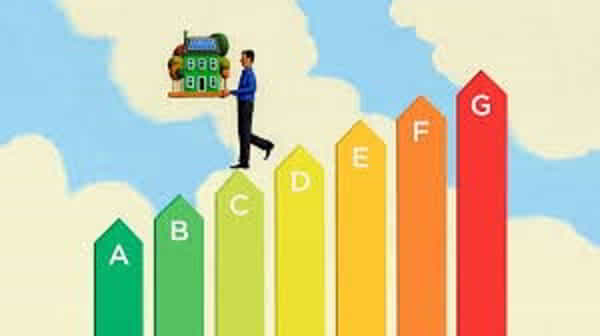
Energy Efficiency Rating – what does it mean and how can it help my budget?
In the UK we use a classification for energy efficient house rating. These rating range from A to G. A rating is classed as the best and G the worst. Over the last 25 years the Government has attempted to upgrade houses to get every household out of EFG ratings and sitting between A and C. This can be achieved with better insulation, wall and loft. Double Glazing etc. Over the last 10 years big steps have been made and now there are only 3% of houses in band F&G.
To achieve more houses moving into the A-C rate would require significant investment on behalf of the householder;
• Over 66% of homes with lower energy efficiency, of D or below, could be brought up to band C for a cost of less than £10,000.
• It would cost less than £10,000 to improve over two thirds of dwellings (69%) to a band C
According to the report improvements to houses could see average fuel savings for dwellings that could be improved to a band C almost £300 a year.
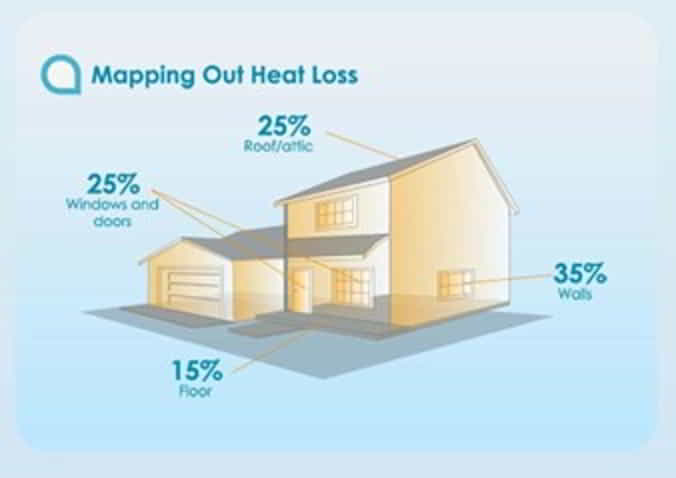
Insulation is the key to lower energy bills
The UK has a historic problem in that we have millions of homes are very old and have insufficient insulation in the roof, walls and windows..
Double Glazing; In 2019, 86% of homes in England had full double glazing
Wall insulation; Around half of all dwellings had cavity or solid wall insulation.
Loft; In 2019, almost half of all dwellings (49%) had at least 150mm of loft insulation.
It makes plain sense that the more we can insulate our homes; windows, walls and roof we retain heat inside and therefore will require less heating and lower costs. The difficulty is the cost of upgrading heating systems and insulation can be expensive and the heating cost savings can take as long as 30 years to get back the initial cash outlay.
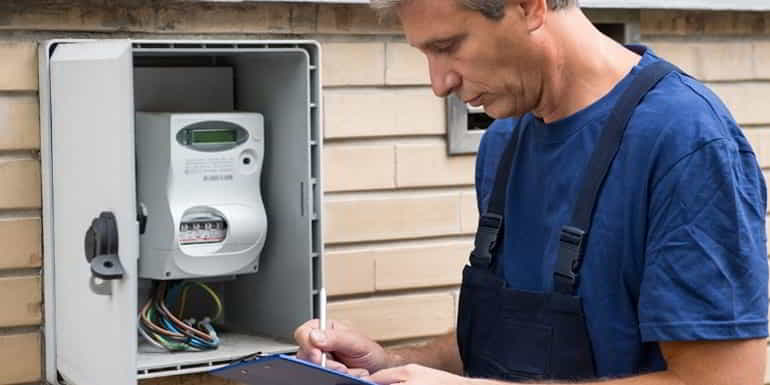
Smart Meters – are they worth installing and why
The government introduced the smart meter scheme to according to them; The rollout of smart meters is an essential national infrastructure upgrade that will make the country’s energy system more efficient and flexible, helping to deliver net zero emissions by 2050.
Over 70% of households do not have a smart meter of the remaining 30% the majority are in housing association or local authority.
Click on any of the tabs on the right to see more information
The average cost of a smart meter is added into your energy bill the same way as a standard meter is, averaging at around £30-70 per household, per month.
This job has to be done by your current energy supplier as it is illegal to complete this job by yourself, costing anywhere between £400-£1,000 and taking around 4-6 weeks. If you want another supplier to move your meter, then you will have to switch to their company for your future energy bills.
The main benefit of getting a smart meter is that you’ll no longer need to take manual readings for your gas and electricity. With a smart meter, all that data is sent to your supplier automatically.
On top of that, a smart meter, with its in-home display, is a good way for you to track your energy usage. With this, you’ll be able to make changes to your energy usage to help protect the environment and potentially save money.
• No more meter readings
• No more estimated bills
• Easily track what you use and spend
• Encourages better energy habits
• Could help reduce your carbon footprint
• Access to cheaper tariffs- energy supplier may offer discounts to switch.
• Uses a mobile signal – Smart meters rely on mobile network and it can fail to send data
• There’s no guarantee you’ll save money
• Thermostat
• Excessive monitoring
• Your meter might not stay smart if you switch suppliers
So, looking at the costs for install and removal and the pros and cons you can see why 70% of people have not put in new meters.

Financial support for energy saving improvements - is it worth it?
Almost 4 million households (17% of households) reported having received financial assistance for energy improvements.
Given the findings relating to the age of the HRP, it is not surprising that length of residence was a good predictor of receipt of financial support. Owner occupiers who had resided in their property for 30 or more years (37%).
The biggest issue with most of these energy saving schemes is quite simple;
The Government introduces a financial scheme to upgrade or renew energy appliances and insulation. Due to the Government’s own rigid rules on third party suppliers only the larger organisations get involved with the scheme. Effectively industry and greedy entrepreneurs hijack the Government scheme by offering consumers the upgrade but the costs are extremely high in comparison to supplying the raw commodity and carrying out the work.
An example of this is loft insulation. Companies call consumers offering the Government scheme and claim it can all be claimed back out of your tax over the next 20 years and cost you nothing. The cost of full installation is £xxxxx equal to a lot of money. But you are fooled into believing it's free, when in actual fact if you look online and check the prices you could do the work yourself for 15% of the cost.
Spray foam Insulation is another great example of a Government scheme. Companies hijack the scheme, call you and say it can be free because it comes out of your taxes and quote £25,000 for doing the average house whereas a local independent specialist could do the work for a fifth of the cost and the raw commodity only costs £1,000 to buy yourself.
Here is a chart from the Government’s own energy report. You can see in simple terms if you pay out £12,000 to have your home improved it will take on average 30 years to get your outlay back.
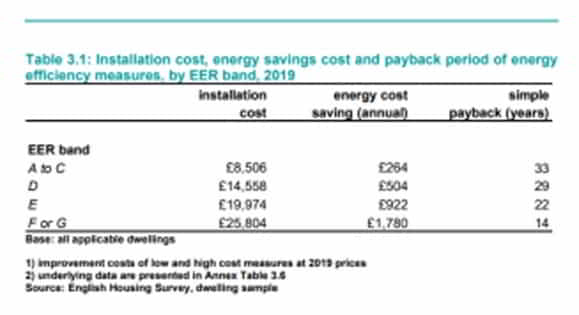
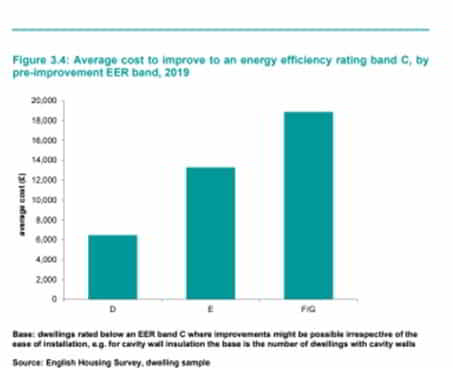
Whereas as an alternative you could do it yourself and just buy your own products or engage a local trades person who will carry out the work. Now, some of the larger Government suppliers will tell you; yes, but our work is guaranteed for 25 years. That’s true, but only if the company continues to trade and they often don’t.
SO, if you live in an older house the cost of insulating to a higher standard say band C is high.
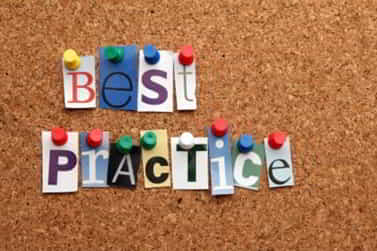
Best practice tips and the best all round approach to heating your home.
One of the best practices you can do apart from the key points below is conserve energy by switching off electrical appliances that you think are off but they are still connected to the electric supply and thereby still using electric so switch them off at the switch.
TV on standby cost £132 a year
Gaming consoles cost £375 a year
Kettle still connected cost £30 a year
Mobile phone connected is £20 a year
So SWITCH OFF ALL appliances you don’t need
Here are some more tips:
- Join an auto switching company which switches suppliers every year if they find a better deal
- Do your own simple insulation for the roof its not rocket science
- Buy the products for loft expansion foam or wall foam and get a local tradesman to carry out the work.
- Install a log burner in your house and use gas or electric as background heating. Use the log burner when the weather extremes kick in.
- Buy 3 cubic meters of logs and store them in your garage and avoid paying the extortionate costs of kiln dried logs
- Always keep with multi fuel heating and cooking in your home. Just look at the last 4 major storms in the UK with up to 300,000 homes power cut off up to 5 weeks. If you had one source heating, even two which required electric then you would have no heating or water. Multi source is best.
I want to keep control of I'm happy to let someone else deal with switching energy supplier
Clicking the button on the back gives you more information and YouDrive’s view!
Auto-switching energy suppliers
Keep control
For visitors
Why don't you join us?
You can register to join us as a member, when you’ll be able to download our stuff and comment, or as a YouDriver when you’ll also be able to check your health and set up your own action plans to make some improvements. If you’ve already registered, sign in below. Or let us know what you think.
Energy Consumption
Energy Consumption
In this 8 minute video Paul Andersen explains how humans have consumed energy through history and may consume energy in the future.

Next Steps
It doesn’t matter what stage you’re at – it’s important to be the best you can be. At the end of the day it’s about taking personal responsibility – You Drive!
It’s really your choice. You can find out more information about the subject, or see other institutions that can help by going to Support. There you will find organisations, training, coaching, self-help courses and other items to support your personal change. We have also started developing a panel of experts to provide info, advice, help and support.
Get Support
There are times when you need some help to meet your aims – a helping hand. That might be an organisation that can provide you with some help, some specialised information, a particular book or tool to help, or just getting some background reading material.
We have a lot of items which appear on our Drives and other pages, which you can go to by clicking on the picture or link. Some contain affiliate links and we may receive a tiny commission for purchases made through these links.
If you know of anything which could help you or our other visitors then please click the button on the right, which will take you to a Contacts page where you contact us.
Experts
We are compiling a list of experts who can provide advice, help or specialised services. You will be able to access these experts from anywhere on our site you see our ‘Experts’ symbol. Click the green E to see what our Experts list will look like, with a couple of imaginary ‘experts’ added!
More Information
Scroll down to see more information on this Drive.
If you register you can also download reports, white papers, quizzes and other collaterals. We will never ask you for any financial information, and we’ll only send you the information you want. You can register for our site either above or in the footer below. You can provide your own questions and experiences in order to help other members. We only moderate for spam and inflammatory language – see our moderation policy.
If you’ve found this interesting, then please share it on social media. Choose your network!
More information
Save Your Energy
Home Energy-Saving Solutions
Save Your Energy – Home Energy Saving Solutions provides dozens of expert tips and tricks to help homeowners save energy and slash their energy bills.
The Consumer Guide to Home Energy Savings
Save Money, Save the Earth (Consumer Guide to Home Energy Savings)
How efficient are front-load washing machines? When is it time to replace your old refrigerator? These questions and many more are answered in “The Consumer Guide to Home Energy Savings”, a one-stop resource for consumers who want to improve their home’s energy performance and reduce costs.
Citizens Advice allow you to compare gas and electricity prices – just enter your postcode
Ofgem offer help on how to switch energy supplier
Citizens Advice information on your energy




















